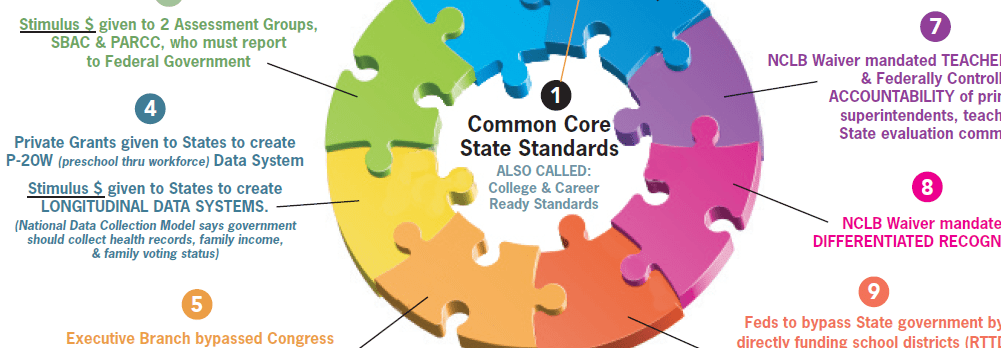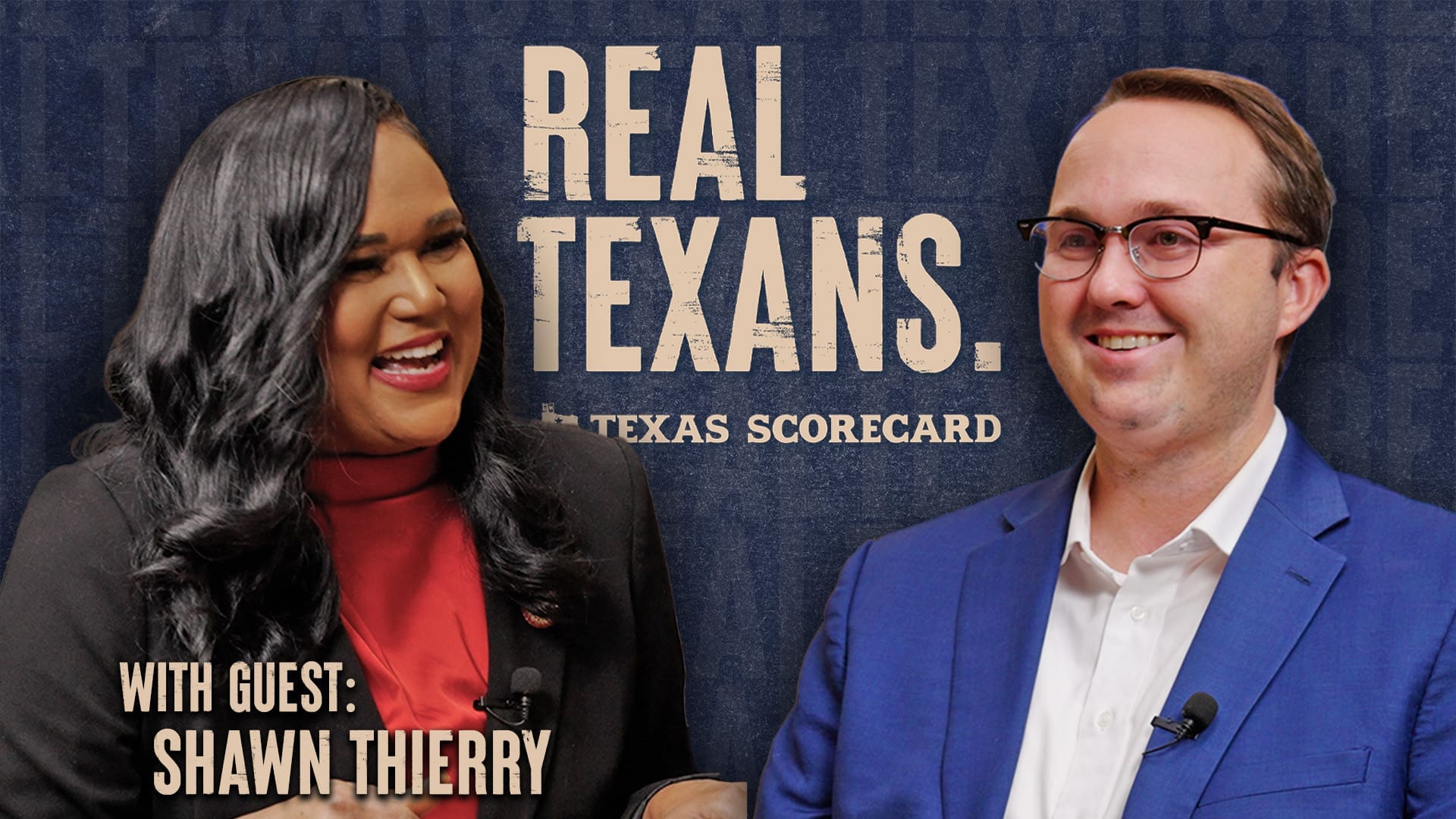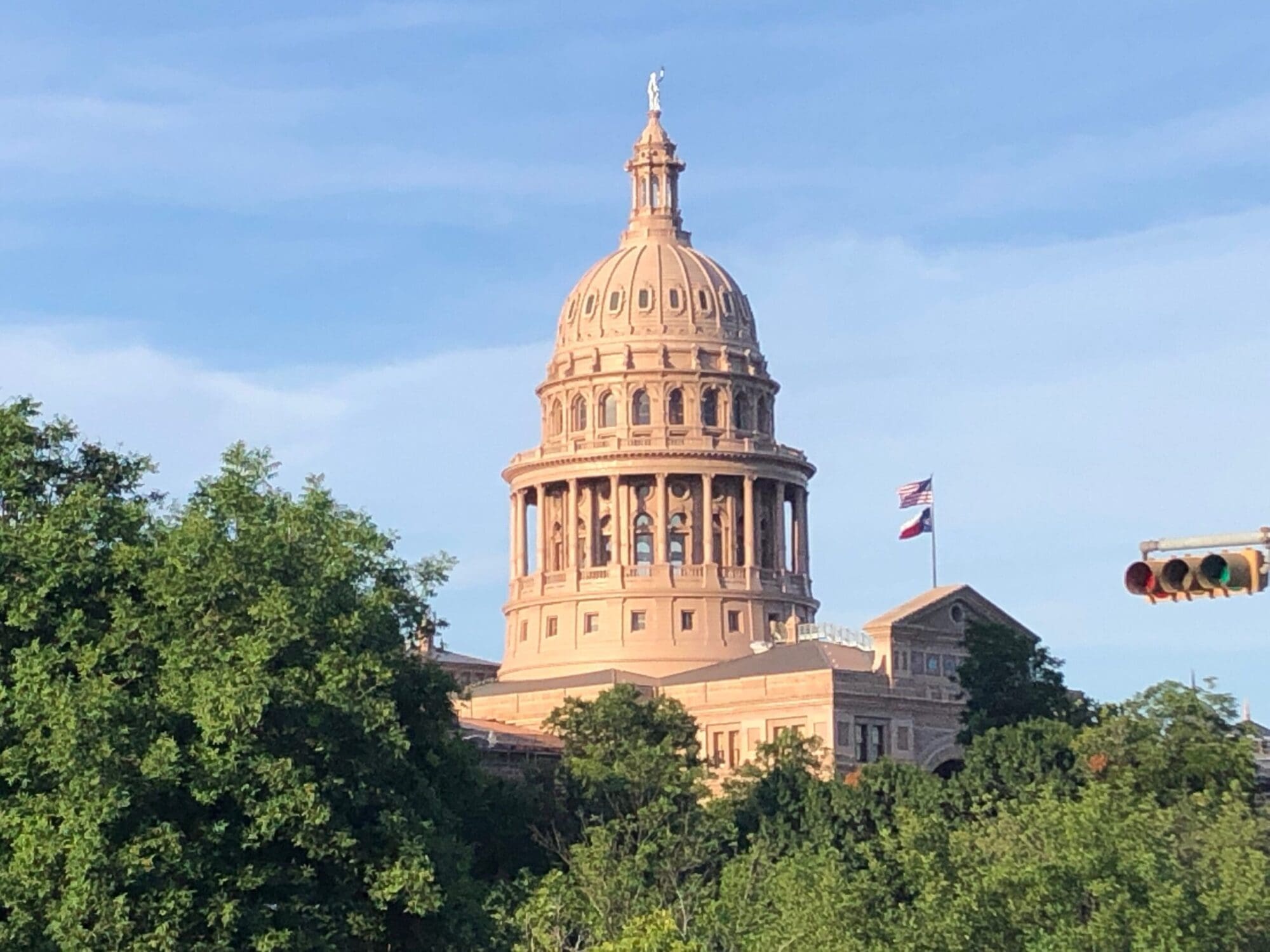The 83rd Texas Legislature overwhelming passed a bill explicitly prohibiting the implementation of the Common Core State Standards Initiative (CCSSI) in K-12 schools. In fact, an original version passed the House 140-2. Following Governor Perry’s signature of HB 462, Texas became one of only several states to pass a prohibition. The language reads;
(b-3): “A school district may not use common core state standards to comply with the requirement to provide instruction in the essential knowledge and skills at appropriate grade levels under Subsection (c).” [Emphasis mine]
A state prohibition of a federally sponsored program makes sense to liberty-loving Texans. Our legislature sets standards on what is taught in Texas, by requiring districts to align curriculum with the T.E.K.S. (Texas Essential Knowledge and Skills) guidelines. The specifics are left to local school boards, teachers and staff.
Texans may be relieved to know that one of the thirteen T.E.K.S. is titled, “Economics with Emphasis on the Free Enterprise System and Its Benefits”.
Students are expected to “analyze the importance of various economic philosophers, including Friedrich Hayek, Milton Friedman…and Adam Smith, and their impact on the U.S. free enterprise system.” Additionally, they are to understand “the basic characteristics of the U.S. free enterprise system, including private property, economic freedom, competition, and the limited role of government…[and to] identify economic concepts in the U.S. Constitution”.
But as Merrill Hope from Breitbart Texas reported, this hasn’t stopped some districts like Denton ISD from selling the “benefits” of Common Core implementation to parents, which is of dubious relevance to state requirements.
In other cases, such as Coppell ISD, it appears there’s a more covert attempt to focus both teaching methods and curriculum alignment with CCSSI. And if CISD is, in fact, aligning their curriculum with CCSSI as stated on their own website, they’d not only be ignoring the T.E.K.S., but explicitly violating state law.
Some districts incorrectly assert that CCSSI can be used to align their curriculum with the T.E.K.S. Attorney General Greg Abbott issued an opinion on this issue. Abbott’s opinion reads;
“Texas school districts are required to provide instruction in the essential knowledge and skills at appropriate grade levels, and pursuant to subsection 28.002 (b-3) of the Education Code, they may not use the Common Core State Standards Initiative to comply with this requirement…Thus school districts must utilize the TEKS standards, not the Common Core Standards.”
Disturbingly, a simple search of the CISD website cites sources of math curriculum referencing the Common Core.

The link listed in the “source” section directs you to the CCSSI website.

But the above isn’t the only reference. Take a look at New Tech High FAQs regarding its curriculum as compared to other CISD schools and those around the state.


In a presentation outlining changes to the T.E.K.S. from one year to the next, the following reference is made in regards to CISD’s alignment of math curriculum to “more rigorous” standards.


Perhaps these are simple errors, or misuses of language…but perhaps they aren’t?
There are several members of central administration who associate with organizations and “thought leaders” who are open advocates of both the Common Core and its implementation. For example, according to the CISD website, Michelle King, Director of Professional Learning at CISD, served on the Dallas Host Committee for Learning Forward’s (LF) 2013 Annual Conference held in Dallas.
According to their website, LF is a “professional learning association” dedicated to promoting specific teaching practices for administrators, principals and teachers…or as they say, professional “learners”.
Stated differently, their goal is to “transform professional learning”.
We found fifteen publications by LF specifically designed to both guide and encourage those in public education to implement Common Core in the district that employs them.
“Learning Forward’s Transforming Professional Learning to Prepare College-and Career-Ready Students: Implementing the Common Core is a multidimensional initiative focused on developing a comprehensive system of professional learning. With an immediate focus on implementing Common Core State Standards and new assessments, the initiative provides resources and tools to assist states, districts, and schools in providing effective professional learning for current and future education reforms.” [Emphasis mine]
As we’ve previously written, some parents in CISD are justifiably concerned with the manner and purpose behind CISD’s launch of several new technology initiatives. A publication produced by Learning Forward titled Meet the Promise of Content Standards: The Role of Technology for Teacher and Student Learning, offers an explanation.
“Understand how teachers use technology to implement Common Core, increase their instructional effectiveness, and support student learning. This brief describes [how teachers are applying] technology solutions to support their own learning and that of their students.” [Emphasis mine]
Other related LF publications include; School-based Professional Learning for Implementing the Common Core, Guiding District Implementation of Common Core State Standards: Innovation Configuration Maps, Seizing the Moment: State Lessons for Transforming Professional Learning, Meet the Promise of Content Standards: Tapping Technology to Enhance Professional Learning.
As listed on CISD’s website, LF’s Learning School Alliance (LSA) offers benefits through a membership with the LSA, including discounts to conferences, webinars and other online tools and support.
Is CISD a member of the LSA?
If they are, do CISD taxpayers want CISD to pay taxpayer dollars to an organization specifically dedicated to training educators on how to implement the Common Core in conflict with state law?
There are several troubling “thought leaders” at this year’s Learning Forward conference. One of the most infamous, Linda Darling-Hammond, was named among the 2013 Top Ten Scariest People in Education Reform by Common Core: Education Without Representation.
As Breitbart Texas also reported, Darling-Hammond’s personal friend, William Ayers (1960’s radical turned professor) petitioned President Obama to replace Department of Education Secretary, Arne Duncan, with Darling-Hammond.
And remember the above T.E.K.S related to “free enterprise and its benefits”? It’s worth noting that neither Ayers nor Duncan (or even President Obama himself) are “capitalism” advocates…in fact, they’re the opposite. They unabashedly promote cronyism through federal education subsidizes, and work tirelessly to centralize education policy in Washington, at the expense of both parental rights and the interests of taxpayers.
Common Core is more than just a set of educational standards; it’s also a teaching philosophy. And there are numerous platitudinal buzzwords that proponents use to describe it, such as “evidence and researched-based content”, “design for learning”, “constructivism” and “understanding by design”, or UbD.
As Merrill Hope noted, Jay McTighe, who wrote a book on UbD, was also involved in creating materials titled “From Common Core Standards to Curriculum: Five Big Ideas,” and “Unpacking the Common Core Standards Using the UbD Framework“.
For a complete list of other CCSSI implementation experts and related programs at this year’s Texas ASCD conference in Dallas, see Hope’s article “Common Core Change Agents Operating in Texas”.
Here’s a short list from only the first two days of the conference:
Common Core, Student Inquiry, and Learning for the 21st Century; Planning for Excellence for all Learners with the Common Core Standards; Aligning the Common Core Standards for Students with Disabilities; What Underachievers Want Teachers to Know and do to Achieve Common Core State Standards; Designing Summative Assessments to Meet Common Core Demands; Lesson Planning for High-Quality Curriculum Aligned with Common Core Standards.
How many staff members of CISD, if any, attended related presentations at this conference?
Did the district pay for or encourage staff to attend Common Core implementation seminars?
Taxpayers can either open records request this information, or ask that their board members to voluntarily provide it directly, if interested. But it appears CISD has found an easier way to expose their staff to Common Core Implementation…by inviting outspoken proponents to speak on campus!
Last week, teachers attended an inservice at Coppell High School with Dr. Bertie Kilgore. On the homepage of Kilgore’s website, she lists an award she won from Learning Magazine for her publications. A recent publication includes content promoting the Common Core and its implementation.
“Current research and the Common Core (CCSS) move the focus of education from mastering content toward a major concern for rigor, relevance, depth, clarity, and understanding how instruction influences all students’ continuous learning and future life in college or the work place. Explore hundreds of ready-to-use ideas…to realistically help you transform your classroom into a rigorous learning environment…[including how to] 1) Implement the CCSS [Common Core State Standards]…”
To be fair, the breadth of curriculum required to satisfy the “Capitalism” chapter of the T.E.K.S. is impossible for districts to cover in twelfth grade, as the legislature recommends. In fact, it’s content is the equivalent of what an Economics student would study in undergraduate and graduate-level coursework.
But so long as any district’s focus is on revolutionizing education by implementing Common Core, as opposed to ensuring that K-12 curriculum is aligned with the T.E.K.S., it’s likely our students will continue to graduate without an appropriate understanding of American history, limited government, property rights, individual liberty or free enterprise and its benefits.
And considering that many of Common Core’s biggest proponents are big-government progressives ideologically opposed to economic and civil liberty, it’s likely that such a “transformation” will all but ensure that our students never do.
Instead of spending tremendous economic and human capital in efforts to “transform” public education in alleged conflict with state law, districts should be finding ways to help support their teachers develop innovative ways to align their curriculum with state guidelines, to the best of their ability.




